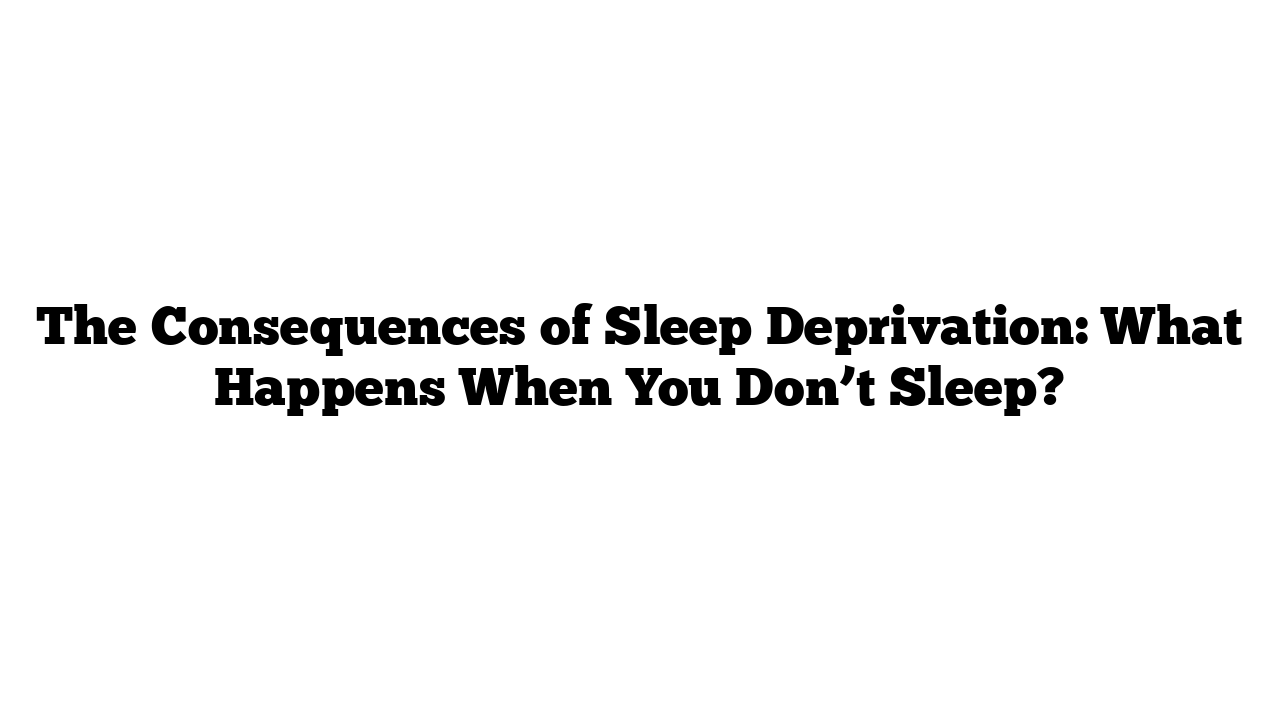Sleep is often underrated in our fast-paced world. However, the consequences of not getting enough rest can be serious. Let’s explore what happens to our bodies and brains when we forgo sleep, starting with a remarkable experiment that highlights the risks.
The Experiment: Randy Gardner’s Record-Breaking Stint
In 1965, a 17-year-old high school student named Randy Gardner decided to stay awake for 264 hours—an astonishing 11 days—to see how he would cope without sleep. His experience offers valuable insights into the effects of prolonged sleeplessness:
- Day 2: Gardner’s eyes stopped focusing, and he began losing the ability to identify objects by touch.
- Day 3: He became moody and uncoordinated.
- End of Experiment: Gardner struggled to concentrate, experienced short-term memory issues, paranoia, and even hallucinations.
While he recovered without long-lasting effects, his case illustrates the dangers of sleep deprivation.
The Importance of Sleep
Though we still don’t fully understand why sleep is vital, we do know it is essential for our well-being. Adults typically need seven to eight hours of sleep per night, while adolescents require about ten hours. As night falls, our bodies send signals to our brains indicating it’s time to rest. Sleep-inducing chemicals like adenosine and melatonin rise, leading to a deeper state of slumber where our bodies can repair and rejuvenate themselves.
Sleep Statistics
In the United States, an alarming 30% of adults and 66% of adolescents regularly suffer from sleep deprivation. This isn’t just a minor inconvenience; it has serious consequences.
The Effects of Sleep Deprivation
When we miss out on sleep, our cognitive functions and physical health take a hit:
- Learning and Memory: Sleep is crucial for memory consolidation. Lack of sleep affects our ability to retain new information.
- Mood: Sleep deprivation can lead to irritability and mood swings.
- Reaction Time: A well-rested person reacts faster than someone who hasn’t slept.
Additionally, sleeplessness can lead to inflammation, hallucinations, high blood pressure, and has even been linked to conditions like diabetes and obesity.
A Shocking Case
In 2014, a dedicated soccer fan tragically died after staying awake for 48 hours to watch the World Cup. Although his death was attributed to a stroke, studies indicate that consistently sleeping fewer than six hours a night increases stroke risk by 4.5 times compared to those who sleep seven to eight hours.
Fatal Familial Insomnia: A Rare Condition
For a small number of individuals, sleep deprivation is a daily reality due to a rare genetic mutation known as Fatal Familial Insomnia. This condition prevents the body from entering sleep, ultimately leading to dementia and death over time.
Why Sleep Matters
The underlying reason why sleep deprivation causes such significant harm may be tied to the buildup of waste products in the brain.
The Role of Adenosine
As we go about our day, our cells break down energy sources, creating byproducts like adenosine. As adenosine levels rise, our urge to sleep increases—a phenomenon referred to as sleep pressure. Interestingly, caffeine works by blocking adenosine receptors, temporarily staving off fatigue.
The Glymphatic System
When we sleep, our brains utilize a cleanup mechanism called the glymphatic system. This system is highly active during sleep and flushes out toxic byproducts using cerebrospinal fluid. Recent research has identified lymphatic vessels in the brain, which help remove daily waste products, further highlighting the importance of a good night’s sleep.
Prioritizing Sleep for Better Health
As scientists continue to study the restorative mechanisms behind sleep, one thing is clear: sleep is a necessity for maintaining our health and mental well-being. Without it, we expose ourselves to a range of detrimental effects on our bodies and brains.
Final Thoughts
Sleep is not just a luxury; it’s a fundamental requirement for our overall health. By prioritizing our sleep, we can improve our cognitive function, mood, and long-term health outcomes. Remember, the next time you’re tempted to sacrifice sleep, think about what your body really needs!
For more information on sleep and its importance, consider visiting trusted sources like National Sleep Foundation or Centers for Disease Control and Prevention (CDC).
